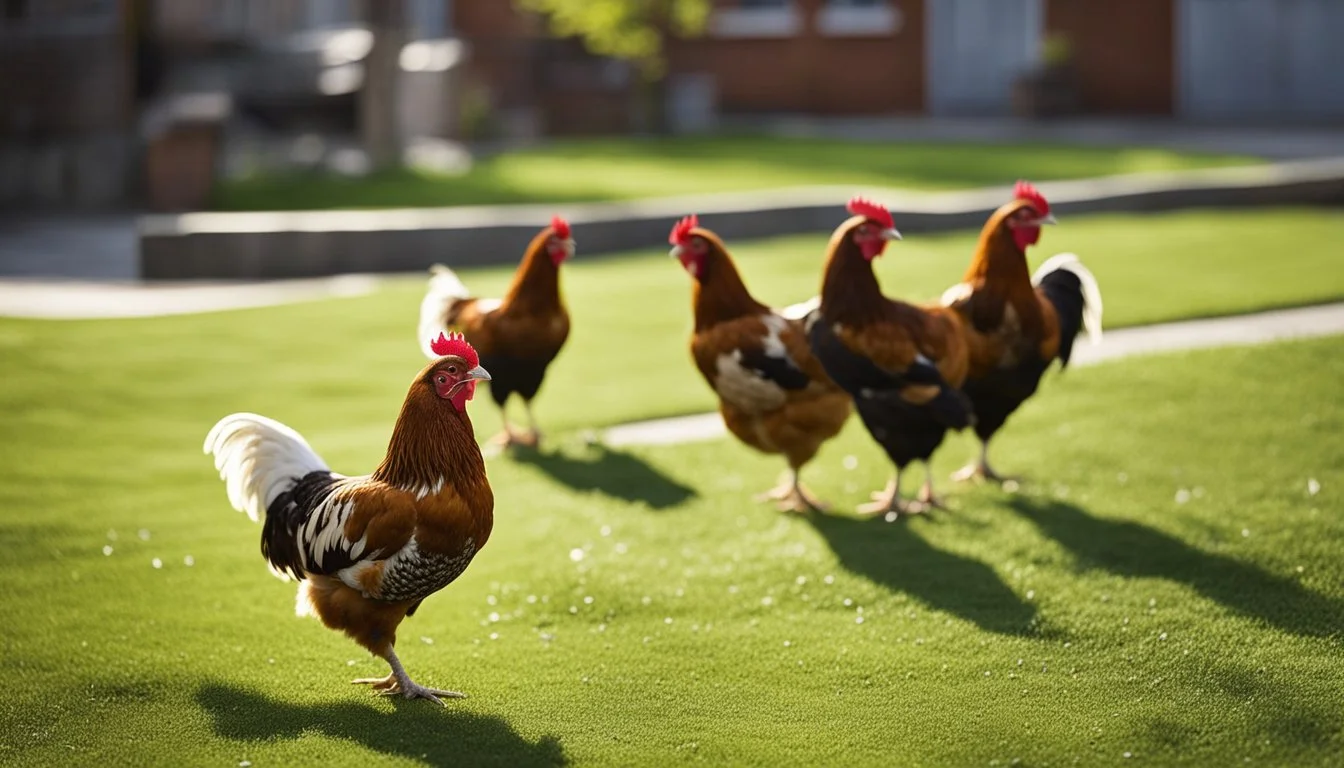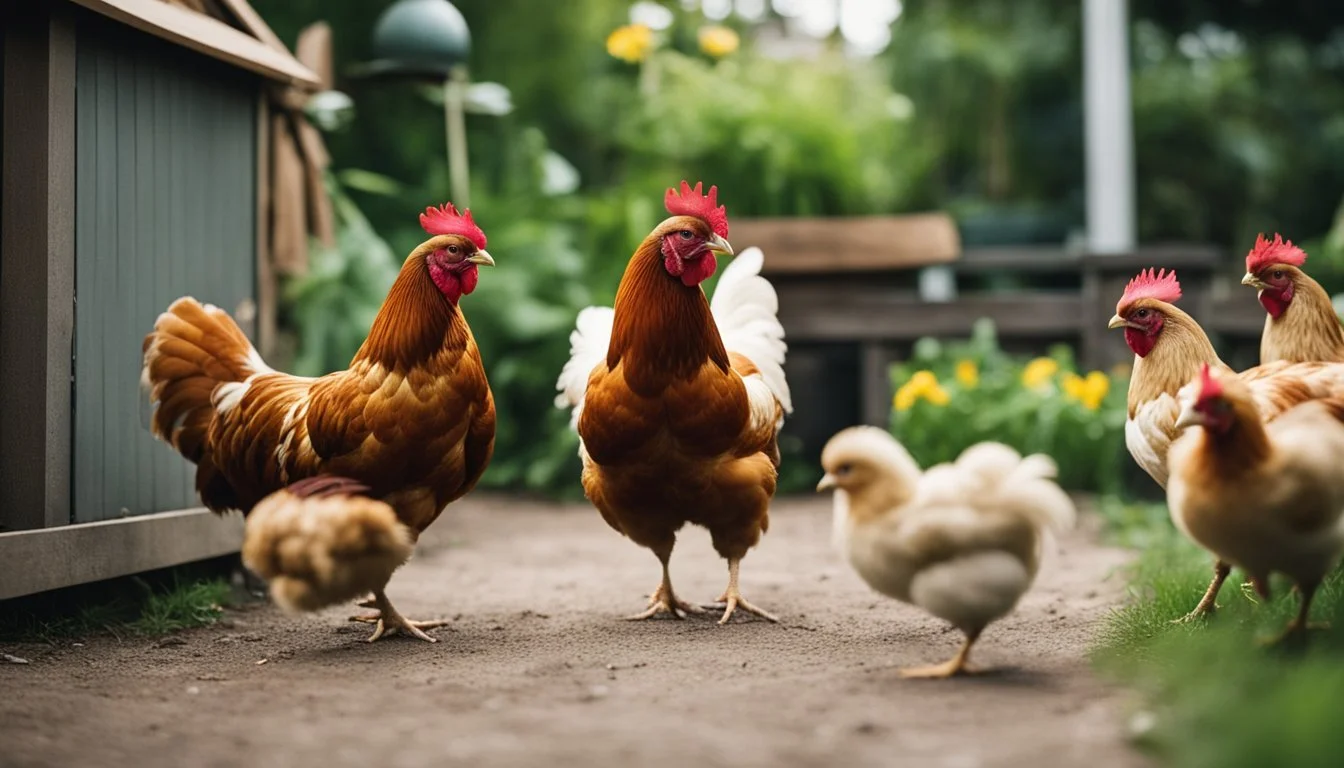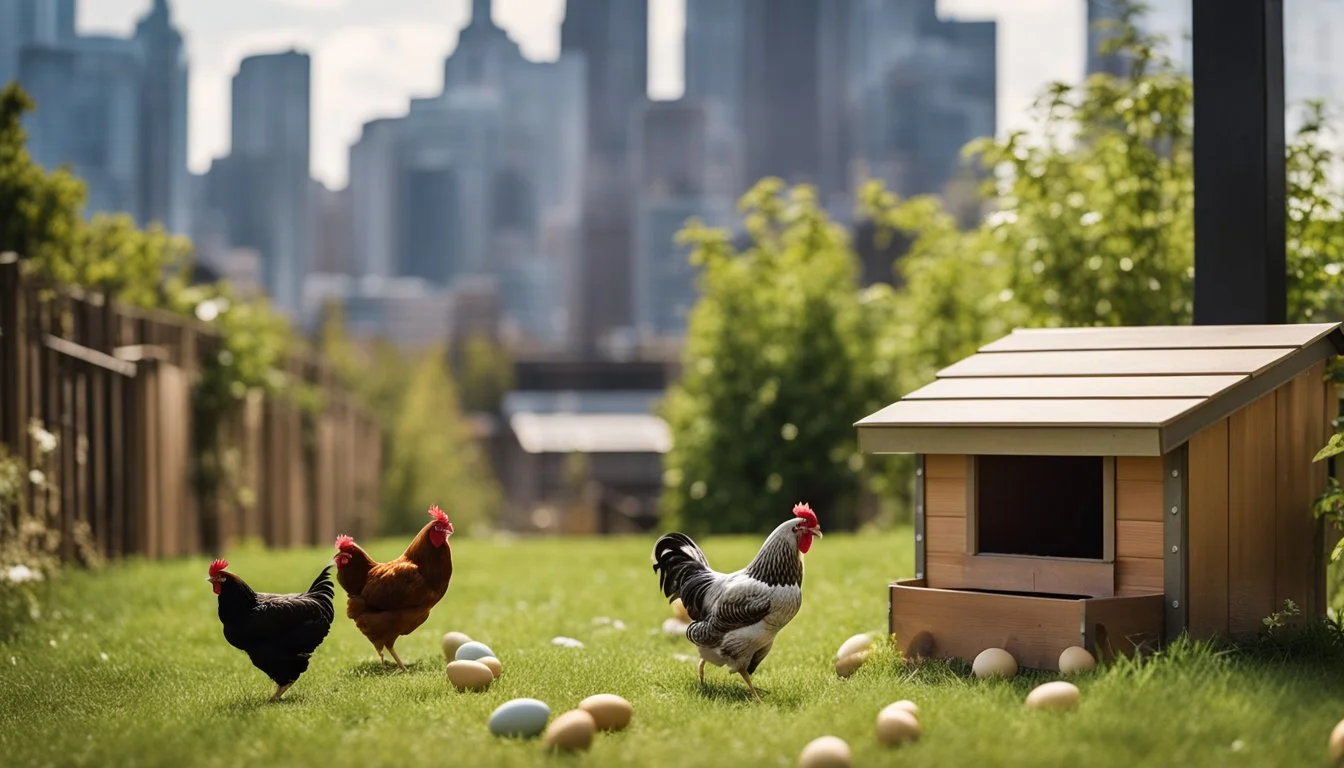8 Benefits of Raising Bantam Chickens in the City
Urban Farming Advantages
Raising bantam chickens in urban environments is becoming a popular trend among city dwellers. These miniature versions of standard chickens bring a unique charm and numerous advantages that make them well-suited for smaller living spaces.
One compelling reason to consider bantam chickens is their adaptability to limited spaces commonly found in urban settings. Their smaller size means they require less room, making them ideal for city backyards or even rooftop gardens. This article will explore eight key benefits of raising bantam chickens in the city, shedding light on why these delightful birds are a great choice for urban poultry enthusiasts.
1) Compact Space Requirement
Bantam chickens are ideal for urban dwellers with limited space. These miniature versions of standard chickens occupy just a fraction of the room needed for their larger counterparts. In terms of dimensions, each bantam requires about 4 square feet in a coop and 10 square feet in a run.
Their smaller size allows for more flexibility in utilizing tight spaces. A backyard or even a small rooftop can accommodate them efficiently. This makes bantams a practical option for people living in densely populated areas where every square foot counts.
Their compact nature doesn't just limit their physical space needs. Bantams also demand less maintenance space for their feed and water systems. All in all, their reduced space requirement ensures they fit seamlessly into city living conditions.
2) Excellent Egg Layers
Bantam chickens, despite their small size, are surprisingly proficient egg layers. They typically produce around two to three small eggs each week. These eggs have a richer yolk-to-white ratio compared to standard chicken eggs, making them popular among urban farmers.
On average, three to four bantam eggs equate to two larger, standard chicken eggs. This makes them an efficient choice for those who may not need a high volume of eggs but prefer quality.
Their egg production can vary slightly by breed, but most bantams are consistent producers. Additionally, bantam eggs are known for their appealing taste, which many backyard chicken enthusiasts appreciate. The smaller egg size can also be useful for various culinary purposes.
3) Low Noise Levels
Bantam chickens are known for their quieter nature compared to standard chickens. Their smaller size usually means their vocalizations are less intense and softer. This characteristic makes them ideal for urban environments where noise control is important.
Roosters are often the noisiest members of a flock. Bantam roosters have gentler crows that are less likely to disturb neighbors. This can help maintain good relationships in densely populated areas.
Hens also tend to cluck more softly. This makes bantam chickens a good choice for those concerned about noise complaints. Their quieter behavior allows them to coexist more harmoniously in urban settings.
4) Pest Control Assistance
Bantam chickens can be a significant asset for pest control in urban environments. These small birds have a natural inclination to forage for insects, effectively reducing the number of pests in your garden.
They are particularly adept at managing common nuisances such as ants, ticks, and beetles. This foraging behavior not only helps maintain a healthier garden but also minimizes the need for chemical pesticides.
Moreover, bantam chickens can assist in keeping weed populations under control. They scratch the soil, uprooting weed seeds before they have a chance to sprout, which helps maintain a cleaner, more manageable garden area.
Bantams are easy to integrate into small urban spaces due to their compact size. Their contributions to pest and weed control can significantly enhance the productivity and health of your garden without taking up much space.
In addition, bantams provide a natural method of pest management, which is both environmentally friendly and sustainable. By reducing reliance on chemical solutions, they help create a more eco-friendly city garden.
5) Unique Outdoor Pets
Bantam chickens make exceptional outdoor pets. Their small size and vibrant plumage add a touch of charm to any urban garden or backyard. Residents find them visually appealing with their distinctive feathers and lively presence.
These tiny chickens are more manageable than larger breeds. Their playful and gentle demeanor makes them suitable for families with children. Kids can easily handle and care for bantams, fostering a sense of responsibility.
Bantams provide practical benefits beyond their beauty. They help control insect populations by foraging, reducing the need for chemical pesticides. This natural pest control aids in maintaining a healthy and sustainable garden environment.
Caring for bantams is relatively straightforward. They require a coop and run that offers enough space for movement and nesting. A well-maintained coop ensures these birds remain healthy and happy, making them a low-maintenance addition to urban settings.
Their egg production, while smaller in quantity and size compared to standard chickens, still contributes to a sustainable food source. Richer in yolk, bantam eggs are sought after for various culinary uses.
These attributes make bantam chickens a delightful and practical choice for anyone seeking unique outdoor pets in an urban environment.
6) Cost-Effective Maintenance
Bantam chickens are an excellent choice for city dwellers due to their cost-effective maintenance.
These small birds consume significantly less feed compared to larger chicken breeds. This results in lower expenditure on feed, treats, and supplements.
Their smaller size also results in reduced waste production, making cleaning and maintaining their living area simpler and cheaper.
Moreover, bantam chickens typically require less space. Smaller coops and runs mean reduced initial setup costs and lower ongoing maintenance expenses.
Overall, raising bantam chickens can be a budget-friendly option for those looking to enjoy the benefits of urban poultry keeping without breaking the bank.
7) Educational for Kids
Raising bantam chickens offers children an engaging, hands-on learning experience. These small chickens teach kids about biology, animal care, and agriculture. Such practical knowledge compliments their academic education.
Children learn responsibility and accountability by feeding and cleaning up after the chickens. Caring for bantams fosters empathy and compassion, as they understand the chickens' needs.
This activity also enhances critical thinking skills. Kids must solve problems and make decisions based on the chickens' health and well-being. Observing the chickens’ behaviors and routines provides insights into animal behavior and life cycles.
Hygiene practices are another educational component. Kids must wash their hands before and after handling chickens or eggs, learning the importance of hygiene and prevent the spread of bacteria. This instills good practices early on.
Bantam chickens are easier for children to handle due to their small size, making the learning process more enjoyable. Their friendly nature helps kids build confidence in managing animals.
By raising bantam chickens, kids gain a better understanding of where their food comes from. This can foster a sense of connection to the environment and agriculture.
8) Natural Fertilizer Production
Bantam chickens are excellent producers of natural fertilizer. Their manure is rich in nitrogen, phosphorus, and potassium, all essential nutrients for growing healthy plants.
This nutrient-dense manure can be used to enrich garden soil, making it more fertile. A small flock of bantam chickens can provide enough fertilizer for an urban garden to thrive.
Additionally, chicken manure helps improve soil structure. It enhances water retention and promotes beneficial microbial activity. For city dwellers, this means healthier plants and reduced need for chemical fertilizers.
Composting chicken manure before application is recommended. This process decreases pathogen risks and converts the manure into a more plant-friendly form.
Households raising bantam chickens can thus sustainably manage waste, transforming it into valuable fertilizer. This practice supports urban agriculture by creating a closed-loop system in city gardens.
Health Benefits
Raising bantam chickens in the city can lead to significant health benefits, including access to fresh, nutritious eggs and natural pest control for urban gardens. These advantages not only contribute to better nutrition but also support sustainable living practices.
Enhancing Nutrition with Fresh Eggs
Bantam chickens produce eggs that, while smaller than those of standard breeds, are packed with nutrients. These eggs contain high levels of protein, vitamins (such as vitamins A, D, and B12), and minerals like iron and selenium. City dwellers can enjoy the freshness of eggs collected daily, which often have a richer flavor due to the hens' varied diet including garden scraps and foraged insects.
Regular consumption of fresh bantam eggs can support muscle growth and maintenance, enhance immune function, and provide essential nutrients for daily energy needs. Moreover, knowing the source of the eggs offers assurance of their quality and the ethical treatment of the chickens, which can be hard to ascertain with store-bought eggs.
Natural Pest Control in Urban Gardens
Bantam chickens are excellent foragers, adept at managing pests in urban gardens. They feed on insects, larvae, and bugs, which helps keep the garden free from harmful pests without the need for chemical pesticides. This natural pest control method can lead to healthier and more productive crops, benefiting residential gardeners with organic produce.
Their natural scratching behavior aerates the soil, promoting better root growth and garden health. Additionally, the manure from bantam chickens is a valuable fertilizer, rich in nitrogen, which enhances soil fertility and boosts plant growth. This symbiotic relationship between bantams and urban gardens supports a sustainable environment and promotes urban agriculture.
Sustainability and Environmental Impact
Raising bantam chickens in urban environments contributes significantly to sustainability through efficient waste management and eco-friendly gardening practices. These birds offer practical benefits by helping to reduce food waste and providing nutrient-rich manure for garden fertilization.
Reducing Food Waste
Bantam chickens consume a wide variety of foods, including kitchen scraps that would otherwise end up in landfills. By feeding leftover fruits, vegetables, and grains to chickens, households can significantly cut down on their organic waste.
This not only reduces methane emissions from decomposing food in landfills but also decreases the overall volume of trash.
Additionally, chickens can eat pests and weeds from gardens, further minimizing the need for chemical herbicides and pesticides. Implementing such practices aligns with urban sustainability efforts by lowering the household's ecological footprint and fostering a more closed-loop food system.
Using Chicken Manure for Fertilization
Chicken manure is an excellent, natural fertilizer rich in nitrogen, phosphorus, and potassium—key nutrients essential for plant growth. Bantam chickens, despite their smaller size compared to standard breeds, produce highly effective manure for enriching soil.
When composted properly, chicken manure can be applied safely to gardens, providing a steady supply of organic matter. This enhances soil structure, promotes healthy microbial activity, and increases water retention.
By substituting chemical fertilizers with chicken manure, urban gardeners can cultivate healthy plants while avoiding the environmental damage associated with synthetic fertilizers. This practice supports sustainable agriculture and reduces reliance on industrial farming inputs.
Community and Educational Value
Raising bantam chickens in urban settings fosters a sense of community. Neighbors often share knowledge, experiences, and surplus eggs, creating a closer-knit community. Initiatives like community chicken coops bring people together, encouraging collaboration.
Urban chicken keeping offers valuable educational opportunities. Many city dwellers are several generations removed from farming. Bantam chickens provide a hands-on way to teach people, especially children, about where their food comes from.
Benefits:
Hands-on Learning: Bantam chickens allow children to engage directly with the source of their food.
Agricultural Education: They offer insights into sustainable practices and animal husbandry.
Community Projects: Community coops and shared responsibilities strengthen community bonds.
Reduced Isolation: Regular interaction with neighbors over shared interests can alleviate feelings of loneliness.
Bantam chickens, being small and docile, are particularly well-suited for providing these community and educational benefits. Their friendly nature makes them ideal for educational settings, where children and adults alike can learn about animal care and food production.








